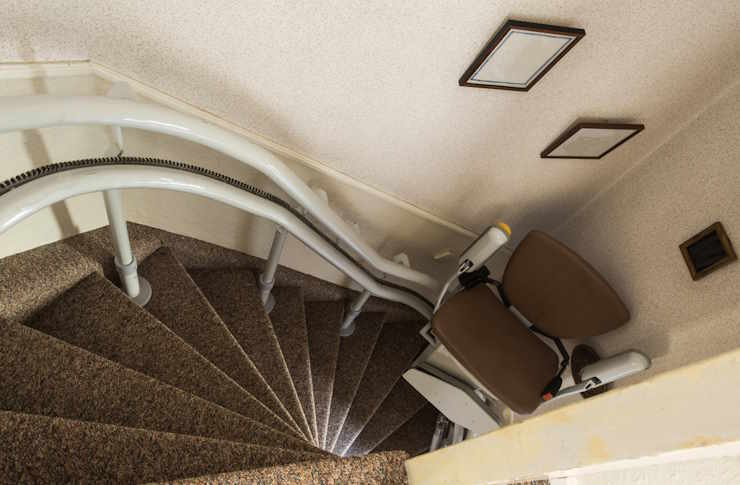Stair Lifts: A Comprehensive Guide to Mobility Solutions for Your Home
Stair lifts provide essential mobility assistance for individuals who struggle with stairs due to age, injury, or disability. These mechanical devices offer independence and safety by transporting users up and down staircases with minimal effort. As the population ages, stair lifts have become increasingly popular home modifications that allow seniors to remain in their homes longer while maintaining access to all levels of their residence.

Understanding Stair Lifts and How They Work
Stair lifts, also known as chair lifts for stairs, consist of a motorized chair that travels along a track mounted to the staircase. The system typically includes a seat, footrest, armrests, and safety features like seatbelts and obstruction sensors. Most models operate on rechargeable batteries that automatically charge when the lift is parked at designated charging points, ensuring functionality even during power outages. The user controls the lift with simple directional buttons located on the armrest, making operation straightforward for individuals with limited dexterity.
Stair Lifts for Seniors: Price Considerations
The cost of stair lifts varies significantly based on several factors including staircase configuration, lift features, and installation requirements. Straight stairlifts typically range from $2,000 to $5,000, while curved models designed for staircases with turns or landings can cost between $8,000 to $15,000 due to their custom-manufactured tracks. Additional features like power-swivel seats, folding rails, or outdoor weatherproofing can increase costs further.
Reconditioned units offer a more affordable option, often available at 30-50% less than new models, though they may have limited warranty coverage. Rental options exist for temporary needs, typically ranging from $200-$500 monthly, plus installation and removal fees.
| Stair Lift Type | Average Price Range | Key Features |
|---|---|---|
| Basic Straight Stairlift | $2,000-$3,500 | Standard seat, manual swivel, basic safety features |
| Premium Straight Stairlift | $3,500-$5,000 | Power swivel seat, adjustable seat height, upgraded upholstery |
| Curved Stairlift | $8,000-$15,000 | Custom rail, navigates multiple landings or turns |
| Outdoor Stairlift | $4,500-$6,500 | Weather-resistant materials, protective cover, enhanced durability |
| Reconditioned Straight Stairlift | $1,500-$2,500 | Refurbished units with partial warranty |
Prices, rates, or cost estimates mentioned in this article are based on the latest available information but may change over time. Independent research is advised before making financial decisions.
How to Get Accurate Stair Lift Quotes
Obtaining accurate stair lift quotes requires thorough assessment of your specific needs and home configuration. Most reputable companies offer free in-home evaluations to measure your staircase and determine the appropriate model. During this consultation, a specialist will assess factors like staircase width, length, angle, and potential obstructions.
To ensure comprehensive quotes, request detailed breakdowns that include equipment costs, installation fees, warranty information, and maintenance plans. Comparing quotes from multiple providers is recommended, as pricing can vary significantly. When evaluating offers, consider not just the upfront cost but also the company’s reputation, service quality, and post-installation support. Many companies also offer financing options, with some providing rental programs for short-term needs.
Alternatives to Stair Lifts for Home Accessibility
While stairlifts represent a popular mobility solution, they aren’t the only option for improving home accessibility. Home elevators provide a premium alternative, accommodating wheelchairs and multiple users simultaneously, though they typically cost $25,000-$45,000 and require significant structural modifications. Platform lifts offer another option for wheelchair users, with prices ranging from $5,000-$20,000 depending on lift height and features.
For more affordable alternatives, consider relocating essential living spaces to the main floor, installing ramps for small sets of steps, or using assistive devices like stair-climbing wheelchairs. Some individuals opt for through-floor lifts or chair glides that operate on ceiling tracks. The optimal solution depends on factors including budget constraints, architectural limitations, expected duration of need, and the specific mobility challenges being addressed.
Choosing the Right Stairlift for Your Needs
Selecting the appropriate stairlift involves evaluating several important factors. First, assess the user’s specific physical needs, including weight capacity requirements (typically ranging from 300-600 pounds) and any special accommodations for conditions like arthritis that might necessitate particular control designs. Then consider your staircase configuration—straight, curved, narrow, or outdoor—as this significantly impacts both available options and cost.
Safety features should remain a priority, including swivel seats that lock in position, retractable seat belts, obstacle sensors, and smooth start/stop functionality. Look for models with foldable components if space is limited, allowing the lift to be tucked away when not in use. Battery backup systems ensure functionality during power outages, while remote controls enable summoning the lift from different floors. Finally, evaluate warranty coverage, maintenance requirements, and the provider’s reputation for service and support.
Conclusion
Stair lifts offer valuable mobility solutions that enable individuals with physical limitations to navigate staircases safely and maintain independence at home. While cost considerations are important, they should be balanced against quality, safety features, and long-term reliability. By understanding the available options, including alternatives to traditional stair lifts, consumers can make informed decisions that best address their specific mobility needs and budget constraints. Professional assessment and multiple quotes will help ensure the chosen solution provides both accessibility and value.




